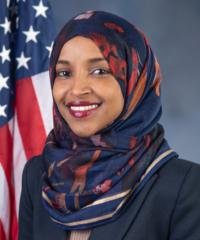
Rep. Ilhan Omar represents Minnesota's 5th Congressional District in the U.S. House of Representatives, which includes Minneapolis and surrounding suburbs.
An experienced Twin Cities policy analyst, organizer, public speaker and advocate, Rep. Omar was sworn into office in January 2019, making her the first African refugee to become a Member of Congress, the first woman of color to represent Minnesota, and one of the first two Muslim-American women elected to Congress.
I believe in an inclusive foreign policy — one that centers on human rights, justice and peace as the pillars of America's engagement in the world, one that brings our troops home and truly makes military action a last resort.
This means reorienting our foreign affairs to focus on diplomacy and economic and cultural engagement. At a time when we spend more on our military than the next seven countries combined, our global armed presence is often the most immediate contact people in the developing world have with the United States. I am a strong advocate for drawing down our out- of-control defense spending and reinvesting those resources back into our local communities. We must also demilitarize our foreign policy by repealing the 2001 AUMF, and reclaiming Congress's constitutional authority over war powers. Doing so is the only way to end our state of perpetual and endless war, and avoid military-use as a last resort in the future.
Creating an inclusive foreign policy also means reconsidering harmful sanctions and other interventionist policies that interfere with democratically-elected governments. Academic research has shown that sanctions achieve their desired goals only about a third of the time and in the worst-case scenario, they can hurt people of a country – generally the very people we're purporting to help – without making a dent in the country's behavior. In Congress, I am pushing to end the use of sanctions and embargoes as a means of punishment and control, and instead focus instead on diplomatic solutions with a long-term strategic vision.
I also feel strongly that our foreign policy should reflect our domestic values. That is why I strongly advocate for international programs that address the climate crisis, increase economic opportunity, end mass incarceration and protect vulnerable populations, just as I do domestically. These are principles that must extend not only to our foreign policies but to the trade agreements we enter into, avoiding any economic bargains that undermine our labor and environmental standards at home or abroad. Once we fully implement these policies, we can begin to repair the harm that's been done, restore America's broken image, and rebuild in diplomatic relationships.